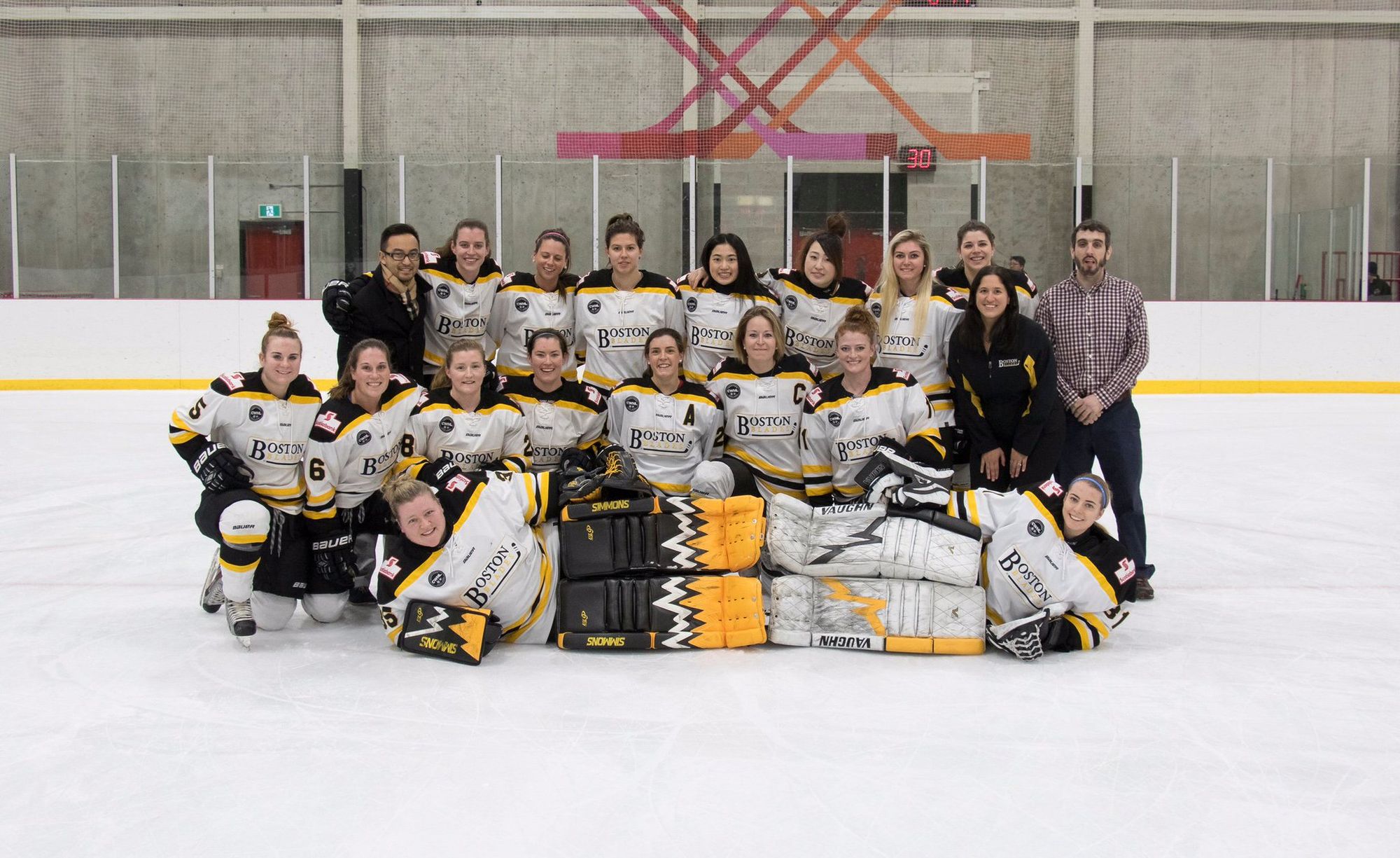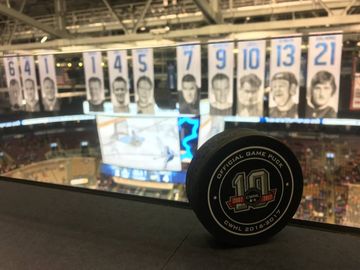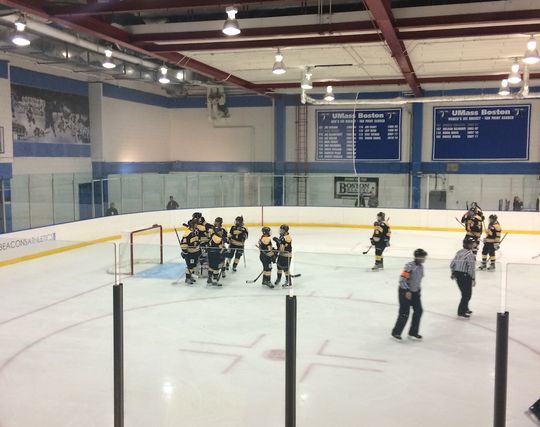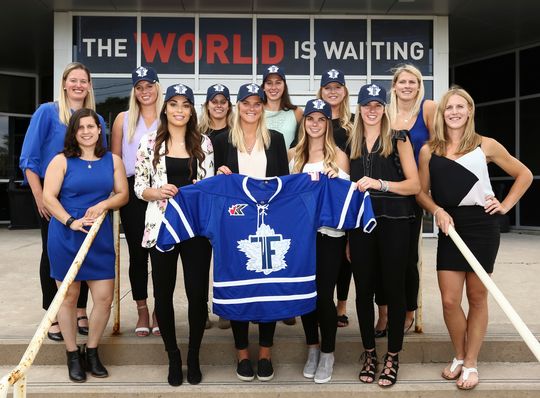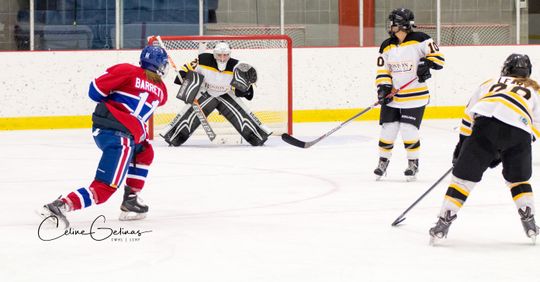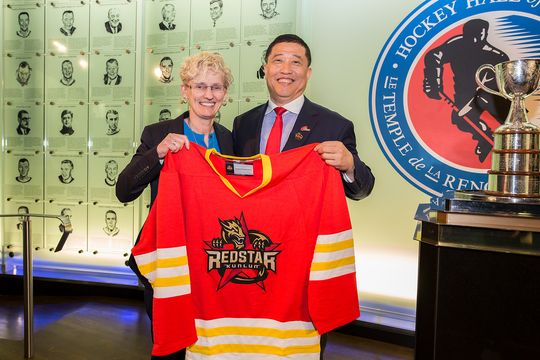On Wednesday, Boston Blades general manager Krista Patronick announced she would be leaving for a Director of Hockey Operations position with Colgate women's hockey. Patronick took over the Blades two years ago, where she inherited a program in the rebuilding phase.
One of her first moves was hiring Brian McCloskey as the new coach. She helped bring in a strong rookie class last year, which included Kate Leary, Meghan Grieves, Melissa Bizzari, and Dakota Woodworth. The Blades finished last in the CWHL for the second consecutive season, but the team made some improvements this year, despite posting just two victories.
The Victory Press caught up with Patronick to chat about her time in Boston, where she sees the team, and where she sees the CWHL in a few years.
The Victory Press: How did you decide on leaving?
Krista Patronick: I had kind of seen the Colgate opportunity and was interested in that, because I've always wanted to work in college hockey. College hockey is what made me fall in love with the sport of hockey when I was in college at UMass Lowell, so that was a big part of my life. I'd always dreamed of working for an NCAA team and just learning more about how they operate. There are aspects of this job that I'm really excited to do in terms of learning NCAA compliance and all of that stuff, so that was really what drew me to it and I'm excited to work in a new and exciting environment. It definitely was not an easy decision to leave. When you put so much of yourself into your job, it's a tough decision, but it just kind of felt like in my gut that this was the right move for me.
VP: What was your overall impression of your experience with the Blades and working in the CWHL?
KP: Honestly, it was overall a really good experience. What I like was that everything is very thought through in terms of decisions and why decisions are made the way they're made. You normally have a few pairs of eyes always on everything, the league is really good in terms of communication with its GMs, so I've always just kind of felt like things were really organized, which is always nice. I mean, sometimes it feels like things are chaotic, [but] I think that's just the nature of the job and the nature of what you're kind of put into. Sometimes you're put into situations that you can't predict. I think the best example of that was when I first started two seasons ago and I dealt with pretty much having to rebuild the team from the bottom up. Nobody can really prepare you for certain things. But I had help from the very beginning from the Director of Hockey Operations, Jess O'Grady, who's not there anymore, but she helped me a lot to just kind of roll through it and get through some hard times and try to rebuild the team. There's always support there, and I was really thankful for that.
VP: How well do you think the team is set up right now to make the next jump?
KP: I think that it's a really good situation. Rebuilding takes time and sometimes it takes a few years -- probably more like three or four years -- so you might see more player movement and stuff like that than you may be expecting to see. But I think overall I feel like I'm leaving the team in a good spot. I've continued to recruit over the summer, so there's definitely going to be some new players coming in to help out with the team. Whoever comes into this role, we'll try to make the transition as soon as possible.
VP: What's the best move you made as a general manager?
KP: I would say hiring Brian [McCloskey] as coach. I mean Brian's just taught me so much about doing my job and running the club smoothly. When you look at the coaches of the CWHL, Brian has such a history and such experience that he brings to the club and he really is like a wealth of knowledge. He loves talking about hockey and he loves hockey. When you talk to him, you just you get that from him. Like you've talked to him, I'm sure you get that from him. He just loves talking about the game and he's a great guy, and I think he's just given this club so much. I think Brian's definitely the best decision.
VP: Where do you see the state of the CWHL at the moment, and where it will be in a couple of years?
KP: I'm super excited to see where it goes in a couple years. I think even every year, it's come even further than I thought it would. Even little changes in the way that things have gone, whether that's little stuff like increasing player incentives or offering them more in terms of awards at the end of the year. They get financial awards if they get voted MVP, or anything like that. And I think that with the addition of China this season, the sky's the limit for what doors this can open up for the CWHL. Maybe it starts with China, but maybe you look to Japan to enter a team. Maybe you look for Finland. Maybe you look at Sweden. Maybe they kind of want to get into the CWHL. There's just so much that this opens in terms of doors for women's hockey, so it's just really awesome to see."
VP: Speaking of China, did that move take you by surprise, and what was your initial reaction to it?
KP: I'm not sure I was totally surprised. I know that China had been looking to invest a lot into their hockey program. I know they had spent the last couple summers coming over here -- they were actually playing out of New England Sports Center in Marlborough for a while and I think we had even looked at setting up some scrimmages, but it never ended up happening because of scheduling. I knew they were kind of looking to ramp up their women's hockey program, but I think it's an awesome move on their part. They definitely picked a great place to enter their team. It's the highest level of women's hockey that there is. You want to be the best so you have to play against the best, and that's definitely the CWHL.
VP: You've personally done some things, I'm thinking of the Ice Boys tryout you jokingly posted a while ago, to boost fan engagement. What has your experience been in dealing with fans and trying to bring more fans out to games?
KP: [It's] actually been awesome. We've definitely done a lot of things...I think even last season we did a lot of stuff where we tried to connect with our fans more. We did a "brunch with the Blades" event, but we have people from all over the U.S. and from Canada sponsoring brunch places for the players, which is awesome. It's kind of cool to see people from all over, not just from Boston, but from all over the U.S. and Canada supporting this team. That's been so cool for me to see. And some people, who I don't even know, but they ask, "How can I help you?" And they want to help the team somehow. That really means a lot. I think it's one thing to do the funny stuff and that really does help get fan engagement (and we've done a lot of awesome events), but I think the bottom line is that when you have someone who's willing to roll up their sleeves or help support the team financially in those aspects, that's what it's all about.
VP: What does women's hockey and the CWHL have to do to help spread the word and market itself?
KP: I think more outreach is definitely needed. I think we're doing the best that we can in terms of spreading the word and stuff, but it's always going to be good if we continue to do that. One of the things that we obviously want to piggyback on as much as possible is seeing if we can continue to get that NHL support or even support from other women's professional organizations, like soccer. In Boston, we have a women's pro football team who we kind of talk to a lot on social media and we try to spread the word about each other's events. Whether that's piggybacking on the success of pro hockey elsewhere or other women's pro sports, I think that we all kind of have to band together and help each other spread the word. Those types of things will be helpful in the future.
VP: I feel there's support for women's hockey at the collegiate level, but that there's a missing link between that and the professional level. What do you think is the key to get that support for the players from college to the professional level?
KP: I think that's got to come from relationships that need to be built between the colleges and at the pro level. I think when we played at [Boston University] we tried to do that, which was, I think one time our game followed the BU women's game so we tried to piggyback on that a little bit. It's just about support, whether that's social support, like social media, or just having each other spread the word about each other's games. I think it's also media support, too. I think it goes both ways. I think that there's a lot of media support for women's pro hockey that maybe doesn't always translate over to NCAA women's hockey, which I think would be cool to see too.
(Photo credit: Chris Tanouye via @BostonCWHL)
This interview has been edited for clarity.
